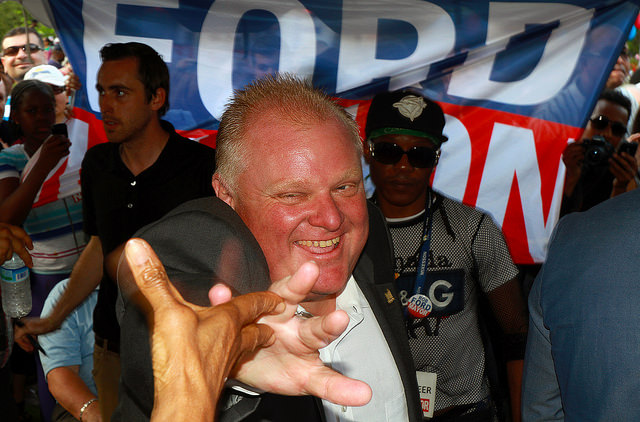Like this article? rabble is reader-supported journalism. Chip in to keep stories like these coming.
I was listening to CBC-Radio’s annual, self-satisfied Canada Reads contest when news of Rob Ford’s death broke in. You couldn’t picture Ford on a panel of advocates for one of those worthy novels — or any CBC panel — yet you could see most other politicians: John Tory, Kathleen Wynne, even Stephen Harper. Rob didn’t register as a culture guy, he was the opposite: The Library Closer.
I imagine he couldn’t have pictured himself being asked either. He makes me think of those union leaders who deeply resent, though they won’t say so, that they’re never invited onto boards by the ROM or Canadian Opera Company. These are among the “hidden injuries of class” that Richard Sennett described, though Ford was nowhere near working class, he was far closer to the 1%. But it’s how you see yourself that counts and even more, how voters see you and themselves, in your image.
Terms used to describe Ford Nation include ordinary Canadians and average guys. But that’s statistically inaccurate and something else is implied: what once were called commoners, plebs, masses; they’re who Ford connected with. He never condescended to them, he was incapable of that. He felt too far down the pole himself, socially and, it seems, in his family, where he was youngest and least smart. He made a virtue of that by not looking down on others.
There have been many strange references to him being human. No one would bother saying John Tory is human but Tory himself called Ford, “above all else, a profoundly human guy.” That’s either a way to say nothing, or it’s a euphemism for something like “loser”; but a loser that other losers can identify with, since he seemed in touch with his own feelings of inadequacy and fear of exposure — which is indeed deeply human. Ford’s own terms for his supporters were taxpayers or customers. Both are reductive — people are far more than that. But they reflect the sense of being exploited and ignored that his constituency felt. Asked what he’d be remembered for, Ford said he’d be remembered! That’s eloquent and poignant; no one should be overlooked. Everybody gets a hug. His own insufferable diva quality was basically a cry for attention: Hey!
Contrast him with his successor. John Tory can’t not condescend, it isn’t in him. He cares about the less fortunate, or whatever phrase he’d use, but he’s above them. He puts himself at their service, not in their place. Even while “serving,” a certain contempt and distance shows, and people feel it. Ford felt dissed too, though he hailed from Tory country. This is less about politics or social status than simple respect or, despite noble intentions, disrespect.
Contrast him also with brother Doug who, I’d say, has little of Rob’s deep identification with society’s losers, those who go unacknowledged. Doug is bluff and confident, hollow to be sure, like many successful people. But he lacks the intuitive connection that Rob had with Ford Nation. You can see it in Doug’s formidable body armour, his sheer definition. Rob had no body armour, just lots of ineffective padding. That evident vulnerability, even physically, may have been his secret political weapon. For his enemies on council, he showed much hate and rage, far less disrespect. He lacked the confidence for it.
Finally, compare him to Donald Trump, as many have. Trump is a similar figure but so different. Trump condescends to everyone, even if he too is heavy with neediness. But people at his rallies can’t identify with him: he affects such superiority. He floats (or flies) far above them. He gives crap to the people who condescend to them and they love him, or at least pay him homage, for it. But it’s not the love his Nation bore Ford, who’d never have waxed on about his own personal beauty or brilliance, or having one of the best brains I’ve ever seen etc.
You’d never find Trump alone in a fast food place, blasted out of his skull, doing island accents. And you’d never hear Trump say he must’ve tried crack “in one of my drunken stupors.” That shows far more self-awareness, even irony, than Trump ever has. Give the edge to Rob Ford there. In fact when it comes to right-wing populist demagogues, I’ll take ours, may he rest in peace, any day.
This column was first published in the Toronto Star.
Photo: Alex Guibord/flickr
Like this article? rabble is reader-supported journalism. Chip in to keep stories like these coming.




